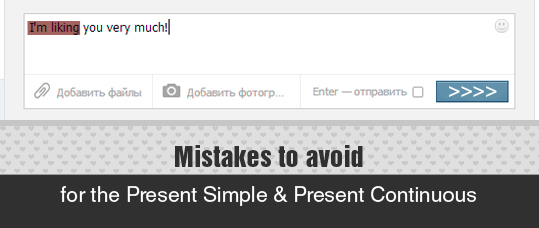Mistakes to Avoid for the Present Simple and Present Continuous
Hi, guys!
Today I'm going to read some sentences to you, and you need to tell me if they are correct or not.
So here is sentence number one.
I sitting here with my friend.
Is it correct? You're right, it's not correct. Please correct it.
I sitting here with my friend.
Ready? I am sitting here with friend! 
Why? Because we form the Present Continuous with “be + verb-ing”.
Where are you sitting now?
Okay, sentence number two.
I am liking you very much.
Is it correct? Nope, it isn't. Let's correct it.
Yay! I like you very much. Why not “I am liking”? Because like is a state verb, and we can't use state verbs in continuous tenses.
What do you like?
Well, here comes sentence number three.
John's friend wake up every morning at nine o'clock.
Is it okay? No, it is not. Let's find the mistake and correct it.
John's friend wakes up!
Why? Because for Present Simple we add –S to the verb when the subject is he/she or it.
When do you usually wake up?
Next sentence.
I am living in London this month.
Is this sentence correct? No? Why not? It's correct. We use the Present Continuous here for a temporary situation. I'm living in London only this month, but next month I'll live somewhere else, so it's temporary.
Where do you live or where are you living now? Tell me 
Are you ready for sentence number five?
He is being happy.
Is this right? No, of course not.
He is happy, not he's being happy. To be happy, not be being happy.
Are you happy? Tired? Sad?
Well, here's sentence number six.
I very like bananas.
Do you think this sentence is correct? Of course not. What exactly is wrong with it? Yes, I like bananas very much. When we want to stress the verb (like) we put very much in the end of the sentence.
What food do you like very much?
Now here is sentence number seven. Listen up!
I meet my friends tomorrow at five.
Correct? Nope, it's not. Let's correct it!
I meet my friends tomorrow at five.
We can use Present Simple to express the future, but when we're talking about timetables and schedules. For example, we can say "The train leaves at ten fifteen tomorrow". This is a timetable, it will leave exactly at this time, so we can use Present Simple.
I'm meeting them at five, of course. Why? Because this is my arrangement, and we use the Present Continuous tense to talk about fixed arrangements in the near future.
Who are you meeting tomorrow?
Thanks for listening!
I hope that you won't make such mistakes after listening to this podcast 
Good luck!
















